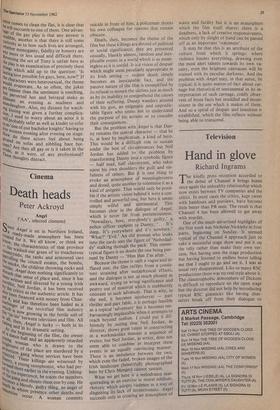Cinema
Death heads
Peter Ackroyd
Angel
(AAA', selected cinemas) Since Angel is set in Northern Ireland, cre,a readY-made atmosphere has been kn—ted for it. We all know, or think we -,b' the characteristics of that province c..-0„-,,"e washed-out green of its treacherous
"trYside the tanks and armoured cars
Dattnii: ' the rig the council estates, the bombs, b_ sinoke, the children throwing rocks and d t„ "Inge/ does nothing significantly to be 40 that sense of place and, since it has novel: Written and directed by a young Irish b,velist, Neil Jordan, it has been received efs the critics as the authentic article. It has 11:een financed with money from Chan- liart:.' and has therefore been hailed as a witi„Inger of the revivified film industry tne—,',I, ts now growing in the fertile soil of in all between television and film. All tintr, then, Angel is lucky — both in its A, g,and in its dramatic setting. Or lle beginning of the film, the owner yon hall hall and an apparently retarded bri Itg Woman who is drawn to the ghtness of Protee.. 0 the place are murdered by a rejee Lion ,-I gang whose services have been 1340,,te'-'' These killings are witnessed by 100;Y, a Young saxophonist, who had per- k' byectihthere earlier in the evening. Unhing- Of the e experience, he traces the members
gang and shoots them one by one. He
44011s a bloody, guilty thing, an an of 096,,, in Whose presence other deathsgel and nities occur. A woman commits
suicide in front of him; a policeman shoots his own colleague for reasons that remain obscure. Death, then, becomes the theme of the film but these killings are devoid of political or social significance; they are presented casually, blankly almost, random and inex- plicable events in a world which is as mean- ingless as it is sordid. It is a vision of despair which might seem peculiarly appropriate in its Irish setting — violent death simply becomes an inescapable fact, and the passive nature of the film is exemplified by its refusal to mourn the victims just as much as by its inability to comprehend the causes of their suffering. Danny wanders around with his gun, an enigmatic and unpredic- table figure who seems not to understand the purpose of his actions or to consider their consequences.
But the problem with Angel is that Dan- ny remains the central character — that he is, at least by implication, a kind of hero. This would be a difficult role to sustain under the best of circumstances but Neil Jordan has added to the problem by transforming Danny into a symbolic figure — half mad, half clairvoyant, who takes upon his own shoulders the guilt and sin- fulness of others. But it is one thing to evoke an atmosphere of meaninglessness and dread, quite another to solemnise it as a kind of zeitgeist. That would only be possi- ble if the artistic vision behind it were a con- trolled and powerful one, but here it seems simply wilful and sentimental. This becomes clear in the dialogue of Angel, which is never far from portentousness. `Nowadays, here, everybody's guilty,' a police qfficer explains to Danny, ... It's deep. It's everywhere and it's nowhere.' `What?' Evil.' An old woman who looks into the cards sees the figure of `Nobodad- dy' stalking through the pack. This stereo- typical figure is no doubt the one being pur- sued by Danny — 'Him that I'm after.'
Because the theme is such a vague and in- flated one, the film suffers from a consis- tent straining after metaphysical effects, and the dialogue is not so much phoney as awkward, trying to wring significance and poetry out of material which is stubbornly resistant to such advances. That is why, in the end, it becomes incoherent — part thriller and part fable, it is perhaps feasible as a topical 'adventure' but it becomes em- barrassingly implausible when it attempts to reach beyond realism. I could put it dif- ferently by noting that Neil Jordan, as director, shows great talent in constructing in a workmanlike manner a sequence of events; but Neil Jordan, as writer, does not seem able to combine or interpret these events in an equally convincing manner. There is an imbalance between the two, which even the faded, broken images of the Irish landscape (beautifully photographed here by Chris Menges) cannot sustain.
What we get here is a melodrama mas- querading as an exercise in moral nihilism, rhetoric which adopts violence as a way of disguisingits lack of inventiveness. Angel succeeds only in creating an atmosphere of
waste and futility but it is an atmosphere which the film itself shares: there is a deadness, a lack of creative responsiveness, which only by sleight of hand can be passed off as an important 'statement'.
It may be that this is an attribute of the culture from which it springs: where violence haunts everything, drawing even the most alert talents towards its own va- cuity, even the brightest canvasses will be stained with its peculiar darkness. And the problem with Angel may, in that sense, be typical: it is quite matter-of-fact about car- nage but rhetorical or sentimental in its in- terpretation of such carnage, coldly obser- vent of brute facts but muddled and incon- sistent in the use which it makes of them. And so a spiral of despair and inanition is established, which the film reflects without being able to transcend.














































 Previous page
Previous page